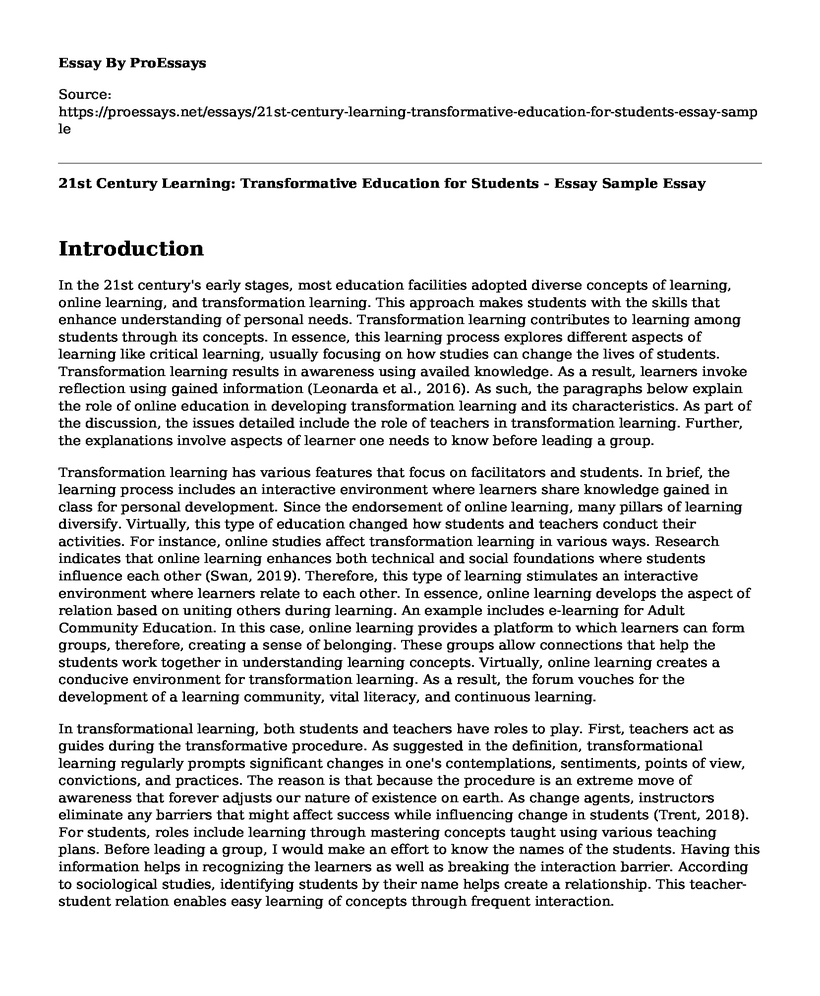Introduction
In the 21st century's early stages, most education facilities adopted diverse concepts of learning, online learning, and transformation learning. This approach makes students with the skills that enhance understanding of personal needs. Transformation learning contributes to learning among students through its concepts. In essence, this learning process explores different aspects of learning like critical learning, usually focusing on how studies can change the lives of students. Transformation learning results in awareness using availed knowledge. As a result, learners invoke reflection using gained information (Leonarda et al., 2016). As such, the paragraphs below explain the role of online education in developing transformation learning and its characteristics. As part of the discussion, the issues detailed include the role of teachers in transformation learning. Further, the explanations involve aspects of learner one needs to know before leading a group.
Transformation learning has various features that focus on facilitators and students. In brief, the learning process includes an interactive environment where learners share knowledge gained in class for personal development. Since the endorsement of online learning, many pillars of learning diversify. Virtually, this type of education changed how students and teachers conduct their activities. For instance, online studies affect transformation learning in various ways. Research indicates that online learning enhances both technical and social foundations where students influence each other (Swan, 2019). Therefore, this type of learning stimulates an interactive environment where learners relate to each other. In essence, online learning develops the aspect of relation based on uniting others during learning. An example includes e-learning for Adult Community Education. In this case, online learning provides a platform to which learners can form groups, therefore, creating a sense of belonging. These groups allow connections that help the students work together in understanding learning concepts. Virtually, online learning creates a conducive environment for transformation learning. As a result, the forum vouches for the development of a learning community, vital literacy, and continuous learning.
In transformational learning, both students and teachers have roles to play. First, teachers act as guides during the transformative procedure. As suggested in the definition, transformational learning regularly prompts significant changes in one's contemplations, sentiments, points of view, convictions, and practices. The reason is that because the procedure is an extreme move of awareness that forever adjusts our nature of existence on earth. As change agents, instructors eliminate any barriers that might affect success while influencing change in students (Trent, 2018). For students, roles include learning through mastering concepts taught using various teaching plans. Before leading a group, I would make an effort to know the names of the students. Having this information helps in recognizing the learners as well as breaking the interaction barrier. According to sociological studies, identifying students by their name helps create a relationship. This teacher-student relation enables easy learning of concepts through frequent interaction.
Conclusion
In conclusion, transformation learning influences learning. In essence, this process has distinctive characteristics; an interactive where students gain new concepts for personal development. The role of online learning in enhancing transformative learning discussed relates to the ability to create a forum that connects students. Further, teachers and learners have specific roles that describe the learning procedure. As discussed, teachers act as guides while students memorize and make sense of the course units. Part of the discussion describes essential information that instructors should know about their students.
References
Leonarda, L., la Marca, A., & Gulbay, E. (2016). Metacognitive Awareness Teaching Tool Kit (MATTK). Reflective teaching for critical thinking and creativity development in classroom. EDUCATIONAL REFLECTIVE PRACTICES, (2), 175-194. https://doi.org/10.3280/erp2016-002012
Swan, K. (2019). RESEARCH ON ONLINE LEARNING. Online Learning, 11(1). https://doi.org/10.24059/olj.v11i1.1736
Trent, J. (2018). "It's like starting all over again". The struggles of second-career teachers to construct professional identities in Hong Kong schools. Teachers and Teaching, 24(8), 931-950. https://doi.org/10.1080/13540602.2018.1477752
Cite this page
21st Century Learning: Transformative Education for Students - Essay Sample. (2023, May 22). Retrieved from https://proessays.net/essays/21st-century-learning-transformative-education-for-students-essay-sample
If you are the original author of this essay and no longer wish to have it published on the ProEssays website, please click below to request its removal:
- The Impact of Family Involvement on the Education of Children
- Ford Government and Students Aids Essay Example
- Stance Essay Example: Media and Young Minds
- Essay Example on Unite Mindfulness & SEL for More Impactful Learning
- Essay Example on Psychosocial Development: Infant to Adulthood
- My Journey to Becoming a Doctor: My Passion and Dedication - Personal Statement Sample
- Free Report on Revolutionizing Language Learning: The Impact of Podcasts in ESL Education







